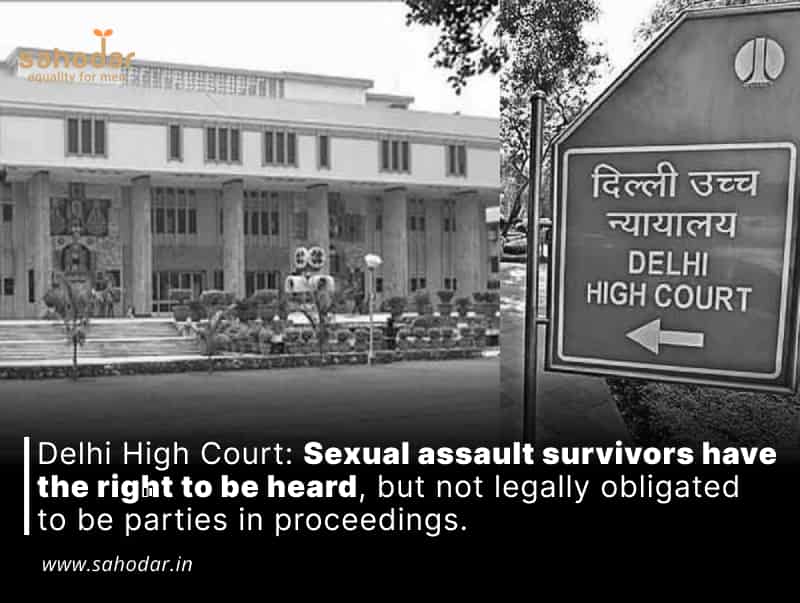The Court also passed a series of directions for its registry to maintain confidentiality of the identity of sexual violence victims.
The Delhi High Court has ruled that while survivors of sexual offenses have the right to be heard in criminal proceedings, there is no legal obligation to make them a party to the proceedings initiated by either the State or the accused. Justice Anup Jairam Bhambhani emphasized that survivors now have extensive participatory rights in criminal proceedings as per the Supreme Court judgment in Jagjeet Singh & Ors vs. Ashish Mishra alias Monu & Anr. However, this does not automatically require making the survivor a party to the proceedings, unless expressly provided for in the statute, the Court stated.
“There is no requirement in law to implead the victim, that is to say, to make the victim a party, to any criminal proceedings, whether instituted by the State or by the accused….,” the Court said.
The Court emphasized that in light of the Jagjeet Singh decision, the right of a survivor to be heard should be included in Section 439(1A) of the Code of Criminal Procedure, even in cases where an accused is seeking anticipatory bail. However, the Court clarified that this does not impose an obligation to make the survivor a party to the proceedings.
“Section 439(1A) CrPC mandates that a victim be heard in proceedings relating to bail, without however requiring that the victim be impleaded as a party to bail petitions; In light of the decision of the Supreme Court in Jagjit Singh (supra), section 439(1A) CrPC. must now be expanded to include the victim’s right to be heard even in petitions where an accused seeks anticipatory bail; a convict seeks suspension of sentence, parole, furlough, or other such interim relief,” the Court said.
Justice Bhambhani presided over a petition for regular bail in a case involving charges under Section 376 (rape) of the Indian Penal Code (IPC) and Section 4 of the Protection of Children from Sexual Offences Act, 2012. During the first hearing, the Court noted that the victim in the FIR had been made a party-respondent, but with her name and details redacted. The Registrar (Filing) filed a report stating that the petitioner was directed to include the victim as a party in compliance with Section 439(1A) of the CrPC and practice directions issued by the Delhi High Court on September 24, 2019. However, after careful consideration, the Court concluded that it is not mandatory to implead the victim of a sexual offense as a party to the criminal proceedings. In addition, the Court issued several directions to its registry to ensure the anonymity and confidentiality of the prosecutrix/victim/survivor.
“The name, parentage, address, social media credentials and photographs of the prosecutrix/victim/survivor must not be disclosed in the filings made in court, including in the memo of parties… The Registry must ensure that such particulars do not get reflected in the cause-list of the court in any manner.”
The Court ordered that files, paper-books, or e-portfolios related to matters involving sexual offenses should only be provided to the parties involved in the litigation and not to any other person. Furthermore, any service to be carried out on the prosecutrix/victim/survivor should only be done through the investigating officer and not through a process serving agency. The investigating officer must also be in plain clothes during the service process to prevent any unnecessary attention, as directed by the Court.
“If the parties wish to cite in court any identifying particulars of the prosecutrix/ victim/ survivor, including photographs or social media communications etc., such party may bring the same to court in ‘sealed cover’; or file the same in ‘sealed cover’ or in a ‘pass-code locked’ electronic folder and share the pass-code only with the concerned Court Master.”
Finally, the Court said that these directions may be summarised in the form of a note or a notification by the Registrar General and be circulated to the Principal District & Sessions Judges and to the Commissioner of Police.
Senior Advocate Rebecca John appeared as Amicus Curiae in the matter. She was assisted by advocates Praavita Kashyap and Anushka Baruah.
Advocates Sudarshan Rajan, Hitain Bajaj, Rohit Bhardwaj, Samreen, Md. Qamar Ali, Ramesh Rawat and Mahesh Kuma appeared for the petitioner.
Additional Public Prosecutor Tarang Srivastava appeared for the State.
Advocates Nitin Saluja, Ankur Sinha and Saahil Mongia appeared for the prosecutrix.
Source: https://www.barandbench.com/news/litigation/survivor-sexual-offence-should-be-heard-no-obligation-law-make-her-party-criminal-proceedings-delhi-high-court

